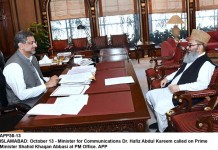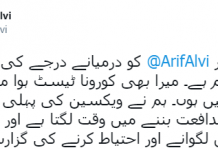ISLAMABAD, Nov 02 (APP): Health experts on Wednesday said that knowledge, attitudes and motivation of health care providers is key component of the enabling environment for advancing maternal nutrition outcomes.
Addressing the seminar on “Role of healthcare providers for improving maternal nutrition” organized by Nutrition International at the 12th Annual Public Health Conference, they said that improved maternal nutrition requires quality counseling services by healthcare providers.
Special Assistant to Prime Minister and Convener National Parliamentary Taskforce on SDGs Ms. Romina Khurshid Alam said that women’s health and wellbeing has been placed at the heart of planning for social service plans by the current government.
She said that SDGs have been fully adopted by the government as their own development goals and nutrition is at the heart of all SDGs.
Dr. Shabina Raza, Country Director Nutrition International said that women’s nutritional needs, particularly during pregnancy are of utmost important.
She said that evidence suggested that pregnant women who received nutrition advice by healthcare providers showed positive changes in their dietary behavior than those who did not.
National Nutrition Survey 2018 shows that only 15% women receive nutrition counseling and only 7% receive counseling on breastfeeding, she added.
She stressed the need to enhance capacity and focus of HCPs on nutrition counseling.
Highlighting the Nutrition International commitment to address maternal malnutrition in the country, Dr. Raza said, “This year marks Nutrition International’s 30 years of work to transform the lives of people – especially women, adolescent girls and children – by improving their nutritional status”.
He said that Nutrition International works with the Federal and provincial governments to improve maternal nutrition outcomes through a combination of approaches, iron folic acid supplementation, multi micronutrient supplement and nutrition counselling besides large scale food fortification.
“By 2030, we have committed to prevent at least 60 million cases of anaemia globally, that heavily impacts women, adolescent girls and children, she added.
Dr. Baseer Khan Achakzai, Director Health Program and Nutrition, Ministry of National Health Services highlighted that almost half of women and children in Pakistan are malnourished, with 14% Women of Reproductive (WRA) being under nourished and over 42% anaemic.
He said that HCPs have the time and opportunity to assess, diagnose, categorize and prescribe the best solution to tackle maternal malnutrition especially during ANC and PNC to women and their families.
Realizing the economic and public health implications of malnutrition among WRA – significance of maternal nutrition and its impact on reduction of child stunting and wasting, the government has developed a national Maternal Nutrition Strategy for Pakistan, he added.
He said that nutrition is a multi-sectoral subject and a coherent and concerted efforts are envisaged as the silver bullet.
Scaling Up Nutrition (SUN) movement Pakistan and its affiliate networks are playing the role for multi-sectoral coordination, said Dr. Nazeer Ahmed, Chief Nutrition, SUN Focal Point.
He said that the government has developed National Multi-sectoral Nutrition Strategy and Action Plan, provincial multi-sectoral nutrition strategies and other sectoral policies and strategies to address the malnutrition status of women and children through embedding nutrition within multisectoral programs.
He said that owing to the COVID pandemic followed by flood emergencies, malnutrition situation has worsened, calling for emergency prioritization by all especially by HCPs.
Field experts from implementing programs, academia and researchers spoke on opportunities of how best HCPs can play their role in advancing the maternal nutrition agenda and overcome gaps that need to be addressed, to break the vicious intergenerational cycle of malnutrition.














